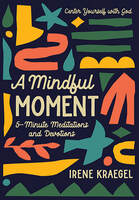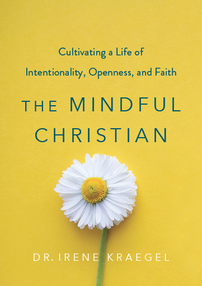|
As Christians, we affirm that God is good and that we can trust him in everything. We commit to listening and responding affirmatively to His voice, to saying "yes" to all that He gives. We trust that what he asks is not more than we can handle, and we know that he works all things out for our good. So what's up with all the complaining? Humans are master complainers, myself included. For most of us, nothing is ever quite right. We're not happy with the little stuff (like the weather), and we're not happy with the big stuff (like the people around us). We have a hard time accepting life as it is -- we have a hard time saying "yes" to what is given. When God hands us a moment, we tend to either ignore it or push it away. This is how our minds create suffering for ourselves, even when we know that God is working all things out for our good. Mindfulness gives us a new option: to say "yes" to the moment, to extend an intentional, open, and curious welcome to each moment of life. With mindfulness, we do not suspend our welcome until a moment proves itself worthy. We extend our welcome to each moment. In doing so, we say "yes" to God -- not just cognitively, but by letting ourselves experience the moment fully in our bodies and hearts. This is confusing in the face of suffering. We live in a world of injustice. In America, we suffer a climate of racism and political strife that is fueling murder and unrest across our country. We are nervous for the safety of ourselves, our neighbors, and our friends. We know that things are not right, that love is not the norm in our world. The more we talk about it, the more polarized things become and the farther we get from understanding one another. Many of us feel tired, worn down, and afraid. There are lots of reasons to reject the moments. The problem is, when we reject a moment, we are blinded to God in that moment, and we are blinded to the path before us. We cultivate wisdom when we pause to welcome what is before us, and this empowers us to act more effectively. Welcoming the moment also gives us the grace to experience goodness in the midst of pain.
2 Comments
Clare
8/5/2016 10:15:35 am
I recently read some interesting articles for health and wellness requirements for insurance coverage. The articles dealt with mindfulness. My husband, a human factors psychologist (with clinical psychologist friends) mentioned that mindfulness combined with cognitive based therapy can be useful. I thought I might benefit from living mindfully. Thus began my search for more information about mindfulness. But the more I searched and read, the more I wondered about how faith can be combined with this quest to living mindfully. I am delighted to find your site! And I look forward to combining the reading of your site with an 8-week workbook on mindfulness. Thank you so very much!
Reply
Irene
8/5/2016 02:45:35 pm
Thank you for letting me know that it has been helpful -- I am encouraged to hear that! I wish you all the best as you work through the mindfulness workbook and explore this beautiful practice.
Reply
Leave a Reply. |
Author
I am Irene Kraegel. I am licensed as a clinical psychologist and teach mindfulness on a faith-based university campus. I practice mindfulness because it opens me up to God (a.k.a. brings joy). I am writing here in hopes of sharing some of my experiences and thoughts related to the practice of mindfulness in the life of a Christian. Thanks for reading! Books
Blog archives
December 2023
|





